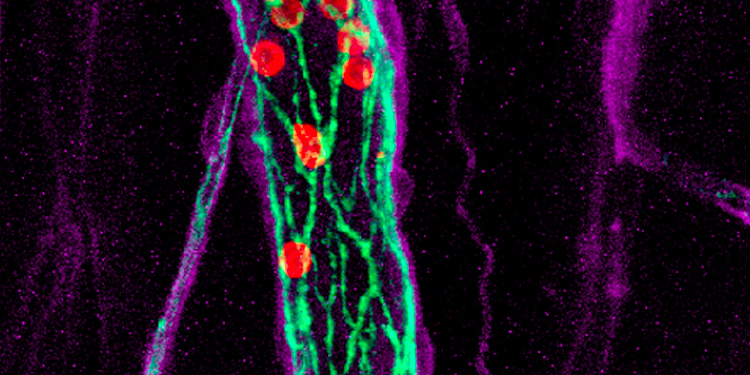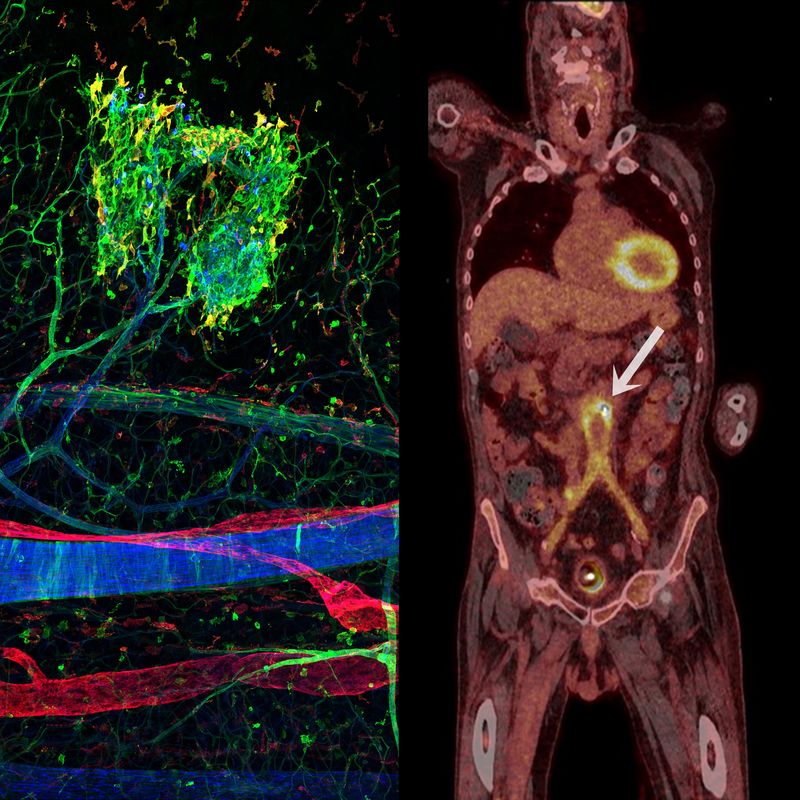

Research Focus "Inflammation & Infection"
Coordinator: Univ.-Prof. Dr. Johannes Roth
The body’s inflammatory reactions, which occur, for example, during infections, infarctions, allergic reactions and autoimmune diseases, have a decisive influence on how a disease progresses in an individual patient. However, it is often difficult to predict exactly how inflammatory processes will develop. In addition, for many acute and chronic inflammatory diseases, there aren’t currently any therapies available that tackle the causes and are, thus, effective in the long term – current medications often only help relieve the symptoms. This indicates there is a need for new diagnostic and therapeutic strategies, the development of which requires a fundamental understanding of cellular and molecular processes in the body. The inflammation and infection research focus at the Faculty of Medicine, therefore, includes both basic and clinical research and combines expertise in immunology, cell biology, microbiology, virology, biochemistry and biomedical imaging.

© Cells in Motion Interfaculty Centre
The scientists involved investigate how the body regulates inflammation and work on identifying functional mechanisms that are crucial for determining whether and how severely organs are damaged by an inflammatory disease. They are using these findings to develop new strategies for medical care. The researchers comprehensively study how different immune cells interact with each other, with surrounding tissues and with infectious pathogens. There is a major focus on cellular barriers that separate the organism from the outside world as well as separating different tissues and organs from each other. They are of particular importance in inflammation processes because they prevent the invasion of infectious pathogens and regulate the migration of immune cells into tissues. An important aspect of this research focus is, therefore, to elucidate the organ-specific mechanisms of inflammation as immune responses differ depending on the organ in which they occur and whether inflammation is local or systemic. Other research focuses on the characteristics of pathogens that allow harmless colonisation processes to manifest infection and on which pathogenicity factors are responsible for damage to specific organs or the development of a chronic infection.

In their investigations, the scientists are using various imaging technologies – from high-resolution microscopy to whole-body imaging technologies such as PET or MRI – and developing them further. With the help of imaging, they are investigating inflammatory reactions at the individual cell level and analysing how these cells function as part of entire organ systems. To do so, they work with cell cultures, conduct examinations in mice and carry out studies with patients.
An important strategy within this research focus is to bring the information gained about these different levels together to create a holistic view that can facilitate the identification of links between cellular inflammatory mechanisms and organ function. This multiscale imaging approach requires new chemical-biological strategies for labelling cells as well as innovative approaches for analysing image data using mathematical modelling and artificial intelligence. Thus, this research field is characterised by strong interdisciplinary and interfaculty collaboration.
The research interest in the field of inflammation and infection within the Faculty of Medicine has a long tradition that is reflected in the success our teams of scientists continue to have acquiring funding for large collaborative research projects through highly competitive procedures. This research focus is also one of the main pillars of the internationally visible profile area of cell dynamics and inmaging at the University of Münster. It is comprehensively supported by scientific centres that institutionalise the collaboration of the Faculty of Medicine with the Faculties of Biology, Chemistry and Pharmacy, Mathematics and Computer Science, and Physics. This includes the Cells in Motion Interfaculty Centre (CiMIC) and its Multiscale Imaging Centre (MIC) – a research building in which working groups from different faculties come together – and the Centre for Molecular Biology of Inflammation (ZMBE).
University Research and Treatment Centre (URTC)
The Translational Centre for Inflammation (TRACI) supports the integration of research and clinical practice in the field of inflammatory diseases. The Faculty of Medicine is supporting the establishment of this University Research and Treatment Centre (URTC), currently in the second of three development stages. It is one of three URTCs selected in a structured process to promote the transfer of research findings into clinical practice and thus to strengthen the research and treatment profile of the Medical Faculty of the University Hospital.
Website of the Translational Centre for Inflammation (TRACI)
Information on the process of establishing URTCs
Pilot phaseResearch networks and centres
Networks with speakers at the University of Münster’s Faculty of Medicine:
- CRC 1450: inSight – Multiscale imaging of organ-specific inflammation (DFG Collaborative Research Centre, 2021 - 2024), Spokesperson: Prof Michael Schäfers (Department of Nuclear Medicine and European Institute for Molecular Imaging)
- CRC/TRR 332: Neutrophils: Origin, Fate & Function (DFG Collaborative Research Centre/Transregio, 2022 - 2026, Spokesperson: Prof Oliver Söhnlein (Institute for Experimental Pathology)
- CRU 342: Organ Dysfunction During Systemic Inflammation (DFG Clinicial Research Unit, 2020 - 2026), Spokesperson: Prof Alexander Zarbock (Department of Anaesthesiology and Intensive Care Medicine)
- Clinician Scientist Programme "CareerS" (DFG funding, 2023 - 2025), Spokesperson: Prof Michael Schäfers (Department of Nuclear Medicine and European Institute for Molecular Imaging)
- Medical-Scientist-Kolleg „InFlame“ (Else Kröner-Fresenius-Stiftung, 2022 - 2026), Spokesperson: Prof Petra Dersch (Institute of Infectiology)
- Cells in Motion Interfaculty Centre: This network connects and supports researchers in the field of cell dynamics and imaging. In addition to the Faculty of Medicine, the Faculties of Biology, Chemistry and Pharmacy, Mathematics and Computer Science, and Physics are involved. Spokesperson: Prof Lydia Sorokin (Institute of Physiological Chemistry and Pathobiochemistry)
- Centre for Molecular Biology of Inflammation: This institution bundles five basic research-oriented institutes in inflammation research. In addition to the Faculty of Medicine, the Department of Biology and the Department of Chemistry and Pharmacy are involved. Director: Prof. Dr. Petra Dersch
- Competence Network Multiple Sclerosis, Spokesperson: Prof Heinz Wiendl (Department of Neurology), Prof Klaus Berger (Institute of Epidemiology and Social Medicine)
Participation in networks:
- CRC 1348: Dynamic Cellular Interfaces: Formation and Function (DFG Collaborative Research Centre, 2018 - 2025), Spokesperson: Prof Christian Klämbt (University of Münster, Faculty of Biology)
- FOR 2690: PRUSEARCH – Translational Pruritus research (DFG Research Unit, 2018 - 2024); Spokesperson: Prof Martin Schmelz (University of Mannheim)
- FOR 2327: VIROCARB – Gycans Controlling Non-Enveloped Virus Infections (DFG Research Unit, 2016 - 2022); Spokesperson: Prof Thilo Stehle (University of Tübingen)
Former research networks
Networks with speakers at the University of Münster’s Faculty of Medicine:
- CRC 1009: Breaking Barriers – Immune cells and pathogens at cell/matrix barriers (DFG Collaborative Research Centre, 2012 - 2024), Spokesperson: Prof Johannes Roth (Institute of Immunology)
- CRC/TRR 128: Initiating/Effector versus Regulatory Mechanisms in Multiple Sclerosis (DFG Collaborative Research Centre/Translegio, 2012 - 2024), Spokesperson: Prof Heinz Wiendl (Department of Neurology)
- CRU 326: Male Germ Cells: from Genes to Function (DFG Clinicial Research unit, 2017 - 2023), Spokesperson: Prof Jörg Gromoll (CeRA)
- ReSToRe: A joint initiative by researchers and clinicians from Belgium, Spain, the Netherlands and Germany to find a cure for multiple sclerosis (MS) (EU Programme, 2018 - 2023), Spokesperson: Prof Heinz Wiendl, Dr. C. Groß (Department of Neurology)
- BiDirect-Studie: Establishing the bidirectional link between depression and subclinical arteriosclerosis (BMBF funding, 2009 - 2022), Spokesperson: Prof Klaus Berger (Institute of Epidemiology and Social Medicine)
- EXC 1003: Cells in Motion (CiM) – Imaging to understand cellular behaviour in organisms (DFG Cluster of Excellence, 2012 - 2019), Coordinators: Prof Lydia Sorokin (Institute of Physiological Chemistry and Pathobiochemistry), Prof Volker Gerke (Centre for Molecular Biology of Inflammation), Prof Michael Schäfers (Department of Nuclear Medicine and European Institute for Molecular Imaging)
- CRC 656: Molecular cardiovascular imaging – from mice to men (DFG Collaborative Research Centre, 2005 - 2017), Spokesperson: Prof Michael Schäfers (Department of Nuclear Medicine and European Institute for Molecular Imaging)
- GRK 1409: Molecular Interactions of Pathogens with Biotic and Abiotic Surfaces (DFG Research Training Group, 2006 - 2016), Spokesperson: Prof M. Alexander Schmidt (Institute of Infectiology)
- AID-NET: Network for autoinflammatory syndromes in children and adolescents (2012 - 2018), Spokesperson: Prof Johannes Roth (Institute of Immunology)
- Research Network Zoonotic Infectious Diseases (BMBF funding, 2016 - 2018), Spokesperson: Prof Stephan Ludwig (Institute of Molecular Virology)
- E-Rare Network: New treatments for auto-inflammatory diseases Treat-AID (EU funding, 2015 - 2019), Spokesperson: Prof Johannes Roth (Institute of Immunology)
Participation in networks:
CRC 944: Physiology and dynamics of cellular microcompartments (DFG Collaborative Research Centre, 2011 - 2022), Spokesperson: Prof Christian Ungermann (University of Osnabrück)
FOR 2722: Novel molecular determinants for musculoskeletal extracellular matrix homeostasis – a systemic approach (DFG Research Unit, 2018 - 2022), Spokesperson: Prof Bent Brachvogel (University of Cologne)
FOR 2327: VIROCARB – Gycans Controlling Non-Enveloped Virus Infections (DFG Research Unit, 2016 - 2022); Spokesperson: Prof Thilo Stehle (University of Tübingen)
- CRC 858: Synergetic effects in chemistry (DFG Collaborative Research Centre, 2010 - 2021) Spokesperson: Prof Armido Studer (University of Münster, Faculty of Chemistry and Pharmacy)
- CRC/TRR 34: Pathophysiology of staphylococci in the post-genomic era (2010 - 2018); Spokesperson: Prof Barbara M. Bröcker (University of Greifswald)
- GRK 2220: Evolutionary Processes in Adaptation and Disease (EvoPAD) (DFG Research Training Group, 2017 - 2021); Spokesperson: Prof Joachim Kurtz (University of Münster, Faculty of Biology)
- MEDizin Unerwünscht im WAsser – MEDUWA Vecht(e) (EU funding, 2017 - 2021)
Participating institutes and clinics
- Centre for Reproductive Medicine and Andrology (CeRA; Prof. Dr. St. Schlatt)
- European Institute of Molecular Imaging (EIMI; Prof. Dr. M. Schäfers, Prof. Dr. F. Kiefer)
- Institute of Anatomy and Vascular Biology (Prof. Dr. H.-J. Schnittler)
- Institute of Epidemiology and Social Medicine (Prof. Dr. K. Berger)
- Institute of Experimental Pathology – ZMBE (Prof. Dr. O. Söhnlein)
- Institute of Hygiene (Prof. Dr. A. Mellmann, Prof. Dr. U. Dobrindt, Prof. Dr. H. Karch)
- Institute of Immunology (Prof. Dr. J. Roth)
- Institute of Infectiology – ZMBE (Prof. Dr. P. Dersch)
- Institute of Medical Biochemistry –ZMBE (Prof. Dr. T. Lämmermann, Prof. Dr. V. Gerke)
- Institute of Medical Microbiology (Prof. Dr. A. Mellmann, Prof. Dr. M. Herrmann, Prof. Dr. J. Kühn)
- Institute of Molecular Tumor Biology (Prof. Dr. M. Meisterernst)
- Institute of Molecular Virology (Prof. Dr. S. Ludwig)
- Institute of Musculoskeletal Medicine (Prof. Dr. T. Pap, Prof. Dr. Chr. Hartmann)
- Institute of Neuropathology (Prof. Dr. T. Kuhlmann)
- Institute of Physiological Chemistry and Pathobiochemistry (Prof. Dr. L. Sorokin, Prof. Dr. J. Eble)
- Institute of Cell Biology (Prof. Dr. E. Raz)
- Institute of Cell Dynamics and Imaging (Prof. Dr. R. Wedlich-Söldner)
- Institute of Cellular Virology (Prof. Dr. M. Schelhaas)
- Department of Anaesthesiology, Intensive Care and Pain Therapy (Prof. Dr. A. Zarbock)
- Department of Ophthalmology (Prof. Dr. N. Eter)
- Department of Dermatology (Prof. Dr. K. Steinbrink, Prof. Dr. T. Görge)
- Department of Cardiothoracic Surgery (PD. Dr. K. Wiebe)
- Department of Nuclear Medicine (Prof. Dr. M. Schäfers)
- Department of Pediatric Rheumatology and Immunology (Prof. Dr. D. Föll)
- Department of Mental Health (Prof. Dr. J. Alferink)
- Department of Radiology (Prof. Dr. C. Faber)
- Max Planck Institute for Molecular Biomedicine - Department Vascular Cell Biology (Prof. Dr. D. Vestweber)
- Max Planck Institute for Molecular Biomedicine - Department Tissue Morphogenesis - (Prof. Dr. R. Adams)
- Department of Medicine A - Hematology, Oncology and Pneumology (Prof. Dr. M. Stelljes)
- Department of Medicine B for Gastroenterology and Hepatology (Prof. Dr. J. Trebicka)
- Department of Medicine D – Internal Medicine, Emergency Medicine, Nephrology and Rheumatology (Prof. Dr. H. Pavenstädt)

